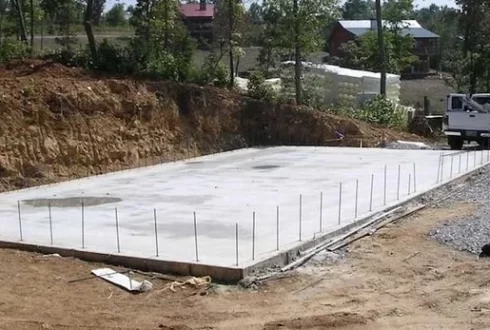Foundations
Foundations
What to Consider When Planning a Foundation
Concrete foundations are essential components of buildings and structures, providing stability, support, and durability. Here is some information about concrete foundations:
Types of Concrete Foundations
• Slab-on-Grade: a common foundation type where concrete is poured directly onto leveled soil or gravel.
• Crawl Space: a raised foundation that allows for access to plumbing and electrical components underneath the building.
• Basement: a below-ground foundation that provides additional living or storage space and often involves deeper excavation.
Construction Process
• Site Preparation: clearing and leveling the site, excavating the area for footings, and ensuring proper drainage.
• Formwork Installation: creating molds or forms for pouring concrete into the desired shape and dimensions.
• Concrete Pouring: pouring and leveling concrete into the forms, ensuring proper compaction and reinforcement.
• Curing: allowing the concrete to cure and gain strength over time through hydration.
Foundation Maintenance and Repair
• Inspections: regular inspections to identify any cracks, settling, or other issues that may require attention.
• Waterproofing: applying sealants or membranes to prevent water infiltration and damage.
• Crack Repair: filling and sealing cracks to prevent further deterioration and maintain structural integrity.
Components of Concrete Foundations
• Footings: the wider base of the foundation that spreads the weight of the structure over a larger area.
• Stem Walls: vertical concrete walls that rise from the footings to support the structure above.
• Rebar (reinforcement bars): steel bars inserted into the concrete to provide tensile strength and prevent cracking.
Factors Affecting Foundation Design
• Soil Conditions: different soil types require different foundation designs to ensure stability.
• Climate and Weather: temperature fluctuations, moisture levels, and frost depth can impact foundation construction and durability.
• Building Load: the weight and design of the structure being built influence the size and strength of the foundation.
Benefits of Concrete Foundations
• Strength and Durability: concrete foundations can withstand heavy loads and resist damage from moisture, pests, and natural disasters.
• Longevity: properly constructed and maintained concrete foundations can last for decades without significant deterioration.
• Fire Resistance: concrete is inherently fire-resistant, providing added safety and protection for buildings and occupants.


